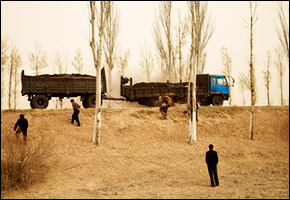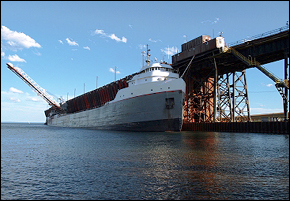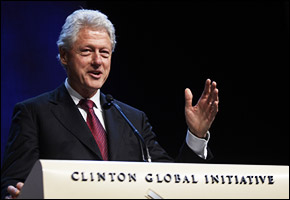Fred Krupp: Changing the Climate at the World Economic Forum
Welcome to Circle of Blue Radio’s series Five and 15, where we’re asking global thought leaders five questions in fifteen minutes, really more or less. These are experts in journalism, science, communications design, technology, and water. And really everything in between. I’m J. Carl Ganter hosting this week.
At the World Economic Forum’s annual meeting Davos, Switzerland, financial meltdowns were on center stage. But not far off in the wings, the heat of climate, energy, water and other environmental challenges was not far from the minds of this global audience.
Today I’m joined by Fred Krupp, president of Environmental Defense Fund. It’s the international organization known for bringing big business into the world of the environment. He is also author of the new book, Earth: The Sequel. It’s a look at how clean technologies can revive the economy and solve global warming.
Fred, we keep hearing that we’re facing some of the greatest challenges in human history. It sounds like such an obvious question, but what are these challenges?
I think the overwhelming challenge to humanity right now is global climate change, global warming. The reason is that life on earth really is at great peril right now. So we’ve got to figure out a way to dramatically lower our emissions of greenhouse gases into the sky, carbon dioxide principally from burning fossil fuels, but also a few other exotic gases that industries use as well. At the same time, we’re in the middle of this global economic crisis. At the same time, we have a brand new administration in Washington that has pledged action on global warming. So you have these three conflicting big tidal waves hitting each other, and the good news is that many economists have come to see that rebuilding our nation’s energy supply is the way out of the global economic crisis; it is the way to provide a lot more jobs in America. I think that makes it a lot more likely it will have the action we need.
So we’ve seen a lot of starts before, even good intentions. But how will the environmental community work with the Obama Administration? Are there pitfalls, and will this be a real team effort moving forward?
Well you’re very right, Carl, that in the past we’ve had good intentions, and sometimes even those good intentions have been written into plans or laws that required plans, and then we see years later that the plans were never implemented and the problems have only gotten worse. So, this time, the environmental community and actually a surprising number of leaders in the business community and in the labor community have all figured out that whatever we do on climate change needs to be premised on the basis of a binding, enforceable, mandatory, reduction in greenhouse gases. That the only way you solve an air pollution problem in this country, or in fact anywhere around the world, is with laws that limit the amount of this stuff that you can throw into the air; and so that will be the litmus test of the law we get in Congress. Now having said that, I think we’ve all, all the stakeholders, have come to understand that the law that implements that binding target needs to be written in a way that is a job creator. We can do that because, say in the Midwest of the United States, we have abandoned factories, people out of work, and it turns out that when we provide incentives to weatherize homes, we put people back to work in jobs that can’t be outsourced. Putting insulation in homes, putting new windows in homes, and those windows by the way, aren’t imported from other countries; they can’t be shipped reliable. So we have window factories making double, event triple glazed windows throughout the Midwest, throughout our economy. The same thing with wind turbines. The wind turbines manufacturers need not only exotic parts but they need just plain old cement and steel. And so the Environmental Defense Fund in these industries that will benefit from a carbon cap because a cap creates customers and customers create manufacturing opportunities and jobs.
We moved right into a discussion of carbon here. But with the public, and even many politicians, there’s a huge confusion about these approaches. Let’s talk about the difference about the carbon tax and carbon cap. What are the pros and cons?
I think the consensus within the environmental community is that we are going to go down the path of a carbon cap. We could still raise revenues by auctioning the initial permits, and so you get the benefit of a tax, but the cap gives you that other benefit of a mandatory cap of legal limit. With a tax, you don’t know how much pollution you’re going to remove from the atmosphere. The declining cap gives you declining pollution. And that I think is a principle reason why the environmental community favors it. Plus the fact that a tax is punitive, but in a cap and trade system you create rewards for the entrepreneurs that figure out how to soak carbon out of smoke stacks or potentially even out of the sky. So all the movement that President Obama has said after he was elected, he’s going to jump start the American economy with a cap and trade program. Henry Waxman has said he’s going to move a cap and trade program out of the House and Energy & Commerce Committee before the end of May. So I think we’re on the road to getting cap and trade legislation. In fact, David Roberts, who writes for Grist, just posted a column where he says that people now advocating for tax, at least many of them, really just want a poison pill to stop the momentum of getting carbon legislation.
Quickly, give me a 101 on the cap, on carbon caps. How does this work?
The way the cap works is that in order to put carbon pollution to the sky if you’re a big industry, you need a permit. If you’re an individual person who drives a car, you don’t need a permit, but in fact the gasoline company that would sell you the gasoline needs a permit to sell you the gasoline because surely it’s going to be burned and put CO2 in the air. And so, the way this works is that there is only a limited number of permits and there will be less and less over time. So, that means that people will be given incentives to buy more fuel-efficient cars, and the fuel companies, so that they’ll have to acquire less permits, they’ll try to take the carbon out of gasoline with advanced biofuels, not traditional corn ethanol so much as the new cellulosic ethanol and other fuels that result in less carbon dioxide when they’re burned. So, basically the way the cap works, and the limited number of permits work, is that it creates a hunt among entrepreneurs to find ways that we can go about our business but that are low carbon. And so we get capital money flowing to the jobs that are creating the low carbon ways of moving around in cars or the low carbon ways of insulating our homes so we use less energy.
I imagine you’ve taken a close look at Obama’s new team. It’s an interesting mix of people like John Holdren on science, Carol Browner, Steve Chu, Lisa Jackson. Will they be running in the same direction and really how do they parse out?
I think Obama has put together an excellent team. Carol Browner in the White House, the energy and climate czar, has eight years of experience running the Environmental Protection Agency in the Clinton Administration. She’s pragmatic and yet definitely ambitious in terms of producing results that will be good for the environment. John Holdren is an excellent Harvard Scientist. It is terrific to have him as a science advisor. It’s wonderful. Steve Chu, a Nobel Laureate, running the Department of Energy, is someone who is familiar with low carbon technologies from his work in the national laboratory that he ran. He’s wonderful. Lisa Jackson with experience running the New Jersey Department of Environmental Protection and also being the Chief of Staff for the Governor of New Jersey. This is a terrific team.
Fred you’ve been working on this a long time. Can you describe some of your toughest days.
Well, on the climate change issue it was distressing to have President George W. Bush take the attitude about climate change, that we really didn’t need action, that voluntary programs were enough. We’ve already tried voluntary programs in the 90’s. They didn’t give us real reductions, and then to have him walk away from the Kyoto Agreement. The Kyoto Agreement was fraud, but instead of constructively engaging to fix the flaws, to have him say, no, he doesn’t like it and he’s not even standing at the negotiating table, I think this was the darkest moment in the many years I’ve been doing this and thank goodness, you know, America is now back among the community of nations trying to solve this problem.
Following on the community of nation’s idea, how will the world follow along on these major issues? Climate is a now issue.
It is right now. Many scientists say that we could afford to stabilize atmospheric admissions at 450 and limit the worst damage. The Environment Defense Fund position though is today’s levels are already too high, 380. We’ve got to keep atmospheric levels at today’s levels, aim for below today’s levels in order to have a chance of really solving this problem. The key going forward is we need the United States Congress to act, to enact a law. We are the last industrialized nation on earth not to have a mandatory limit on our greenhouse gases. We cannot expect the developing nations to come forward with even more substantial plans until we say we are going to act. China has already made some good commitments. So has Mexico, so has Brazil. And we will need them to do more, for sure. But the first step in that process will be for us, the largest emitter in the world over the last 50 years, to finally agree to cut our own emissions, and then we’ll have a much stronger hand in the international negotiations in Copenhagen in December of 2009, pressing other nations to do more as well.
Well, climate change has really taken the lead, center stage here, but what about the other major issues?
We know if we don’t fix climate change and all the other things that EDF works on, we will be in very bad shape. We have decided to establish a priority and climate change is our biggest program because we want to not just work on things but get results and to have an impact on the United States Congress and the Copenhagen Agreement. It takes a lot of resources. A lot of people. We have a gigantic team. The largest of any United States environmental group working on climate change. Having said that, we have another large program in Oceans. Our fish stocks are collapsing, and we have been getting progress on oceans, and that is very important that we get the fish stocks around the United States Coast recovered. We have a program in water and wildlife. We’ve dewatered our rivers in the Seattle mountains. Many of these rivers flow with four or five percent their natural flow. How can you expect the animals and plants to live in that environment. And we’re working with private land owners to give them incentives to restore habitats so that many endangered creatures can thrive again. We also work on human health issues like air pollution. So we’re still doing all that good work. In some areas, that work is even expanding now even though the economy, you know we have tough times, and it’s harder to get the funds we need, but we can’t stop the other work. It’s all really, really important too. And the way that EDF is managed, you know, we have ten-year goals, five-year goals, three-year goals, one-year goals, quarterly goals, we manage to get results. And we’re getting results in all those areas.
Well we’re here at the world economic forum. It’s another planet in some respects, and you’ve been to so many of these forums. How now is the corporate planet, so to speak, responding now to these issues?
I came to this year the World Economic Forum expecting to hear a lot of talk about the economic crisis, and we have certainly had that. What surprised me in four days of meetings, I have not heard a single corporation say that the economic problem should delay our taking action on climate change. In fact, climate change has continued to be one of the three primary themes at this conference, and it’s being talked about by the economist, by the world leaders, and by the heads of corporations, as a way out of the economic crisis. So, you know, in the great depression, FDR did many things, but the historians tell us we didn’t really get out of the depression until the World War. Now, we have a war to fight against climate change and the spending that will be needed, the retooling that will be needed, the people that will need to go to work rebuilding America. that not only is worthy central work we need to do, but increasingly I’m hearing around the World Economic Forum that it is the path out of this recession.
Thank you Fred. Fred Krupp is President of the Environmental Defense Fund. We’ve been at the World Economic Forum’s Annual Meeting in Davos, Switzerland. For more on climate and water policy and related issues be sure to tune in to Circle of Blue online at 99.198.125.162/~circl731. Our theme is composed by Nadav Kahn, and we’ve had support today from Traverse Legal, PLC. Join us again for Circle of Blue Radio’s Five in 15. I’m J. Carl Ganter.
Circle of Blue Radio is made possible with generous support from Traverse Legal. Thumbnail images of Mr. Krupp provided by the World Resources Institute Staff.
Circle of Blue’s east coast correspondent based in New York. He specializes on water conflict and the water-food-energy nexus. He previously worked as a political risk analyst covering equatorial Africa’s energy sector, and sustainable development in sub-Saharan Africa. Contact: Cody.Pope@circleofblue.org










Why isn’t mobbing and gangstalking ever in the news, only on the Internet, never on talk shows, radio, tv, newspapers, magazines, etc, when there is so much of it going on and what about the guys we overheard talking about how they pour their used motor oil down storm drains and into lakes and rivers and the ocean as a way of getting even for gangstalking and what is anyone doing about that and other things we heard them talking about and why are the cops and firemen and so many others in on gangstalking and getting away with it.